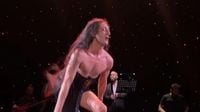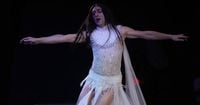Alexandre Paulikevitch stood backstage at Beirut’s Metro al-Madina, adjusting his white dress and wig under the glare of the dressing room lights. The thrum of a sold-out crowd waiting outside mixed with the knowledge that fundamentalist groups—ranging from right-wing Christian Soldiers of God to Sunni Islamists—had threatened to disrupt his performance. Yet, as Paulikevitch stepped onto the stage, the only thing that greeted him was a roaring ovation and the eager applause of hundreds of fans, according to the Associated Press.
Paulikevitch’s performance on September 13, 2025, was not just another night of dance in Lebanon’s bustling capital. It was a bold act of defiance against social norms and extremist threats that have grown louder in recent years. His expressive movements—hips swaying, arms undulating, eyes rimmed with eyeliner—were set to classical Arabic music, an homage to the region’s lost tradition of male dancers. Yet, for some in Lebanon, his performance was an affront to their values. Groups like Soldiers of God accused him of "promoting homosexuality" simply because he wore dresses and corsets, a style they claim undermines societal expectations of masculinity.
"I’m not promoting anything, I am just dancing. If you want to come watch me, come," Paulikevitch said from his changing room, his tone both weary and resolute. He dismissed the notion that his appearance or art was an agenda to change society. "They think if one looks a certain way, that means they have an agenda to convert society. If the society was going to convert, it would have happened hundreds of years ago."
The tradition Paulikevitch draws upon is far older than many of his critics realize. In the 19th and early 20th centuries, male dancers were celebrated in Egypt and across the Arab world for their expressive, sensual movements. Today, those same styles are largely shunned, replaced by a Westernized, often exoticized, notion of "belly dancing" that ignores the art’s historical nuance. Paulikevitch sees his work as a tribute to his favorite dancers and songs, a reclamation of what was once commonplace for men in the region.
But the stakes are higher than artistic authenticity. Lebanon, while often described as a rare haven of tolerance for the LGBTQ+ community in the Middle East, is still a land of contradictions. Years of activism—from organizations like Helem, the first NGO for queer rights in the region, founded over two decades ago—have carved out spaces for expression. Nightlife venues like Metro al-Madina host drag shows and welcome queer performers. Yet, crackdowns on free speech and expression have surged, and violence against LGBTQ+ individuals has not abated.
Security forces called the Metro al-Madina before Paulikevitch’s show, expressing concern for his safety. The venue’s management responded by hiring extra police. Armed officers stood outside as the performance began. But, in a twist that felt almost anticlimactic, no protesters or attackers appeared—only an audience eager for art and perhaps, a little hope. "We dance because we have no other option. We dance because whatever happened and whatever is happening to us, this is our resistance," Paulikevitch told the crowd after his first number, his white dress catching the stage lights, as reported by the Associated Press.
Lebanon’s atmosphere has grown increasingly fraught since 2019. The collapse of the country’s banks and the decay of state institutions have plunged more than half the population into poverty. The devastation from the 2024 conflict between Hezbollah and Israel has only deepened the country’s woes. In this environment, queer communities and their allies have found themselves periodic targets of both state and non-state actors. The summer of 2023 saw Lebanon’s culture minister attempt to ban the film "Barbie," claiming it "promotes homosexuality and transgenders." Right-wing groups mobilized against anything displaying rainbows—from cakes in bakery windows to children’s board games. In some incidents, their actions turned violent, including an assault on a Beirut bar hosting a drag show, where patrons were forced to hide in bathrooms.
Paulikevitch is no stranger to the risks. He has been attacked, beaten, and even imprisoned. He spent a year detained under Lebanon’s ambiguous laws criminalizing sexual activity "against nature," which some interpret as including same-sex acts. During the 2020 protests that rocked Lebanon, Paulikevitch was among the activists beaten and arrested by riot police outside the Central Bank. Yet, his activism has never been limited to LGBTQ+ rights—he has championed labor rights, fought domestic violence, and stood with protesters demanding change from Lebanon’s entrenched political class.
"I have a problem with you the same way you have a problem with me, but the difference between us is that I respect you," Paulikevitch said, addressing his detractors. "Even if your beard or your appearance bothers me, I respect and accept you as you are. You can’t see me as I’m not getting near you, (so) why do you have such a problem with me?" For Paulikevitch, the fight is not about imposing his choices on anyone, but about the right to exist and perform without fear.
His performances have become more than just art; they’re acts of resistance. "Me putting this makeup and putting (on) my dresses is a political act, (whether) I want it or not. Doing what I do is resisting, is giving the possibility for others to be inspired, to say it is possible. I’m paying a high price, but ... maybe, maybe I can inspire someone."
Paulikevitch’s story is emblematic of a broader struggle in Lebanon, a country where identity and expression are contested on every street corner and in every parliament chamber. The fractured, sectarian power-sharing system has made the LGBTQ+ community a rare bridge of unity—an irony not lost on those who find themselves targeted by both sides of the cultural divide. The ongoing culture wars in Lebanon echo those in the United States and Europe, but with stakes that are often more immediate and personal.
As Paulikevitch’s band struck up a traditional melody and he took his place center stage, the audience watched—some smiling, others mesmerized, many filming on their phones. The performance was a reminder that, even in times of turmoil, art can carve out space for resistance, joy, and the possibility of change. The night ended without violence, but the struggle for acceptance and freedom in Lebanon continues, one dance at a time.
For Paulikevitch and those inspired by him, the message is simple: to dance is to resist, to exist is to inspire, and to keep moving is, perhaps, the bravest act of all.





